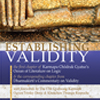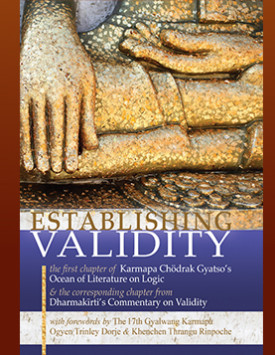
Within the Tibetan tradition, the most highly regarded proof of rebirth is Dharmakirti’s long treatment of it in the chapter “Establishing Validity” from his Commentary on Validity, which is presented in this book along with the Seventh Karmapa Chodrak Gyatso’s commentary on it from “The Ocean of Literature on Logic.”

Establishing Validity
by the Seventh Karmapa Chodrak Gyatso, translated by David Karma Choephel, forewords by the 17th Gyalwang Karmapa and Kenchen Thrangu Rinpoche
KTD Publications 2016
Hard cover
6 x 9, 400 pages
$34.95
ISBN: 978-1-934608-54-8
LCCN: 2015951254
Designed and typeset by Gopa & Ted2, Inc.
Jacket design by Louise Light
Printed in the United States on acid free 100% PCR paper, FSC, GPI
Establishing Validity: The First Chapter of Karmapa Chödrak Gyatso’s Ocean of Literature on Logic
and the Corresponding Chapter from Dharmakīrti’s Commentary on Validity
Chos-grags-rgya-mtsho, Karma-pa VII, 1454–1506. Tshad ma kun las btus pa sde bdun
dang rigs pa’i gzhung mtha’ dag gi sgo nas bshad pa/ tshad ma rjod par byed pa thams cad kyi
chu bo yongs su ’du ba rigs pa’i gzhung lugs kyi rgya mtsho zhes
bya ba las le’u dang po/ tshad ma grub pa.
Dharmakīrti, 7th c. Pramāṇavārttikakārikā, Prathamaḥ paricchedaḥ, Pramāṇasiddhi.
The Seventh Karmapa Chodrak Gyatso was a prolific author who composed many texts including a commentary on the seven books on logic by Dignaga and Dharmakirti.
This book presents the first chapter of Chodrak Gyatso’s Ocean of the Literature on Logic, which is his commentary on the first chapter of Dharmakirti’s Compendium of Validity. That is in turn an extensive explanation of the verse of homage from Dignāga’s Compendium of Validity, which reads:
I bow to him who became valid,
The one who wishes to help beings,
The teacher, sugata, and protector.
Contents
Foreword by His Holiness the Gyalwang Karmapa Ogyen Trinley Dorje vii
Foreword by Khenchen Thrangu Rinpoche ix
Translator’s Introduction xi
A Note on the Numbering of Verses xlv
A Brief Introduction to Indo-Tibetan Logic xlvii
Acknowledgements lv
Part 1
Establishing Validity: The First Chapter of The Ocean of Literature on Logic
by the Seventh Karmapa Chödrak Gyatso 1
Part 2
Establishing Validity: The First Chapter of The Commentary in Verse on Validity by cārya Dharmakīrti 235
Appendix 1: The Outline of “Establishing Validity” According to The Ocean of Literature on Logic 277
Appendix 2: Works in the Tengyur Attributed to Dignāga and Dharmakīrti 289
Sources and Abbreviations 291
Notes 295
Index 329
Foreword
by His Holiness the Gyalwang Karmapa Ogyen Trinley Dorje
The Seventh Karmapa Chödrak Gyatso was a respected scholar, an artist and a realized meditator. He spent much of his life travelling throughout Tibet, accompanied by the Garchen or Great Encampment, a huge nomadic community of monks, nuns and lay practitioners. During his time, the Garchen reached its peak, numbering 10,000 people. The community comprised scholars, meditators, a shedra for the study of Buddhist philosophy, and a school of thangka painters, as well as skilled metal workers. The Seventh Karmapa founded an annual Garchen prayer festival which was held during the Festival of Miracles in the First Month of the Tibetan year. Whenever he appeared at public events such as this, tens of thousands of people would gather from all over Tibet just for the chance to glimpse him. Wherever the Garchen went, Chödrak Gyatso and the members of the encampment would bring benefit to the people of that area by settling disputes, giving advice and help, and teaching the Dharma. The Seventh Karmapa spent much of his time in private, meditating, teaching, and engaging in scholarly activity, and he has left us several works on both philosophy and meditation. The best known of these are his Indian Texts on Mahamudra, a three-volume collection of spiritual songs and instructional texts on mahamudra meditation by the great mahasiddhas of India, and his Ocean of Literature on Logic, a commentary on the works of Dignāga and Dharmakīrti. His wondrous abilities are witnessed by the fact that he dictated the latter from memory without recourse to any of the texts or other commentaries. To this day, it remains and important part of the course which nuns and monks follow in their monastic colleges. The first chapter, “Establishing Validity” is considered especially important because of its discussion of the authority of the Buddha and its treatment of rebirth, because this helps students develop the faith necessary to progress along the path. I have known and worked with bhikshu David Karma Choephel for more than ten years now and I have great confidence in his ability as a translator. I welcome the publication of his latest translation which wil enable foreign students to begin the study of validity. I am certain that it will bring benefit to many.
Foreword
by Khenchen Thrangu Rinpoche
Generally, whatever actions we do, whether worldly or Dharma, we must first know what is correct and valid and what is incorrect and invalid. Furthermore, if once we know this we engage in unmistaken, unconfused, valid actions, it is definite that in the end we will achieve the proper result. But if we engage in something mistaken, confused, and invalid, we will not achieve a proper result. For this reason, it is important to know the teachings on what is valid and what is invalid. For this reason, Dignāga and Dharmakīrti elucidated what the Buddha taught in bits and pieces in the sutras in their treatises The Compendium of Validity and The Commentary on Validity. In particular, the first chapter of Dharmakīrti’s Commentary “Establishing Validity” explains clearly and in depth the profound and vast intent of The Compendium’s three lines of homage:
I bow to him who became valid,
The one who wishes to help beings,
The teacher, sugata, and protector.
Later the Seventh Gyalwang Karmapa Chödrak Gyatso commented on Dharmakīrti’s intent in his commentary on validity The Ocean of Literature on Logic. Additionally, in his general discussions he combined his explanations with the teachings of the Second Karmapa Karma Pakshi in his Infinite Oceans of Validity. Thus it is clear and easy to understand. The logic is sharp and easily brings certainty. It has the quality that those with sharp faculties who follow the Dharma will be able to develop a superior certainty not based on others’ persuasion and from which others cannot dissuade them that our Teacher the Bhagavan Buddha is valid and that the True Dharma he taught is valid as well. For that reason, I thought that translating it into English, the universal language of this age, would bring great benefit to people of many different ethnicities living in different lands and countries. When I expressed this opinion to the bhikshu Lotsawa David Karma Choephel, he agreed and went to great effort to translate it. I pray and supplicate that this will bring great benefit to the teachings and beings.
Translator’s introduction:
“Within the Tibetan tradition, the most highly regarded proof of rebirth is Dharmakirti’s long treatment of it in the chapter “Establishing Validity” from his Commentary on Validity, which is presented in this book along with the Seventh Karmapa Chodrak Gyatso’s commentary on it from The Ocean of Literature on Logic. Dharmakirti discusses rebirth in two long passages that together encompass well over a third of the chapter. Yet for Dharmakirti, the discussion of rebirth is just a supporting argument in the proof of his main thesis of this chapter: that the Buddha Bhagavan is valid—a reliable authority whom spiritual practitioners can trust to guide them to enlightenment. Intertwined with this is the issue of the conventional validity or epistemology—how do we evaluate whether we have trustworthy knowledge or not. As subsidiary arguments in his proof of the Buddha’s validity, Dharmakirti also discusses many other issues as well, including whether a divine creator exists, the meaning of omniscience, the causes that lead to buddhahood and their results, and the natures of the four noble truths in addition to the logic of past and future lives. Dharmakirti frames these questions in the context of refutations of ancient non-Buddhist schools, but the issues that he treats and the way that he deals with them are still relevant to thinkers and spiritual practitioners of today.”
Dzogchen Ponlop Rinpoche
“The great Indian paṇḍitas Dignāga and Dharmakīrti founded a system of logic and epistemology that revolutionized Indian thought by systematizing the Buddha’s teachings on the way mind sees its world. Their thought remains an indispensable pillar of Buddhist studies to this day. Through the centuries of Indian and Tibetan commentary upon the seminal works of these two masters, few texts, if any, can compare to the profundity and breadth of Ocean of Literature on Logic by the Seventh Karmapa, Chödrak Gyatso. By commenting on the line-by-line meaning of Dignāga and Dharmakīrti’s verses, as well as providing a wealth of in-depth analysis of their implied meaning, the Seventh Karmapa’s magnum opus stands as one of the finest accomplishments of Tibetan scholarship. I am therefore very happy that, under the sage guidance of the great Khenchen Thrangu Rinpoche, David Karma Choephel has made available to the public an English translation of the first chapter of the Ocean of Literature on Logic, the chapter that deals with establishing the Buddha as a source of authoritative knowledge. I rejoice in this wonderful contribution to the field of studies of valid cognition; I am confident that students of Buddhism, as well as other sciences of knowledge, will derive great benefit from this book.”
George Dreyfus, Jackson Professor of Religion at Williams College
“This book makes a great contribution by providing an excellent translation of the first chapter of one of the most important Tibetan works on Buddhist logic and epistemology by the Seventh Karmapa. His work offers a unique and masterful synthesis of the works and ideas of the great Buddhist thinkers Dignaga and Dharmakirti and hence should be of interest to all those who are interested in Buddhist philosophy. By providing us with this very accessible translation, David Karma Choephel offers his readers an ideal avenue into this complex tradition and I greatly look forward to future volumes. This volume examines more specifically Dharmakirti’s proofs of past and future lives and of the possibility of enlightenment, and hence should be of great interest to all those, Buddhist or not, who are interested by these fundamental topics.”
